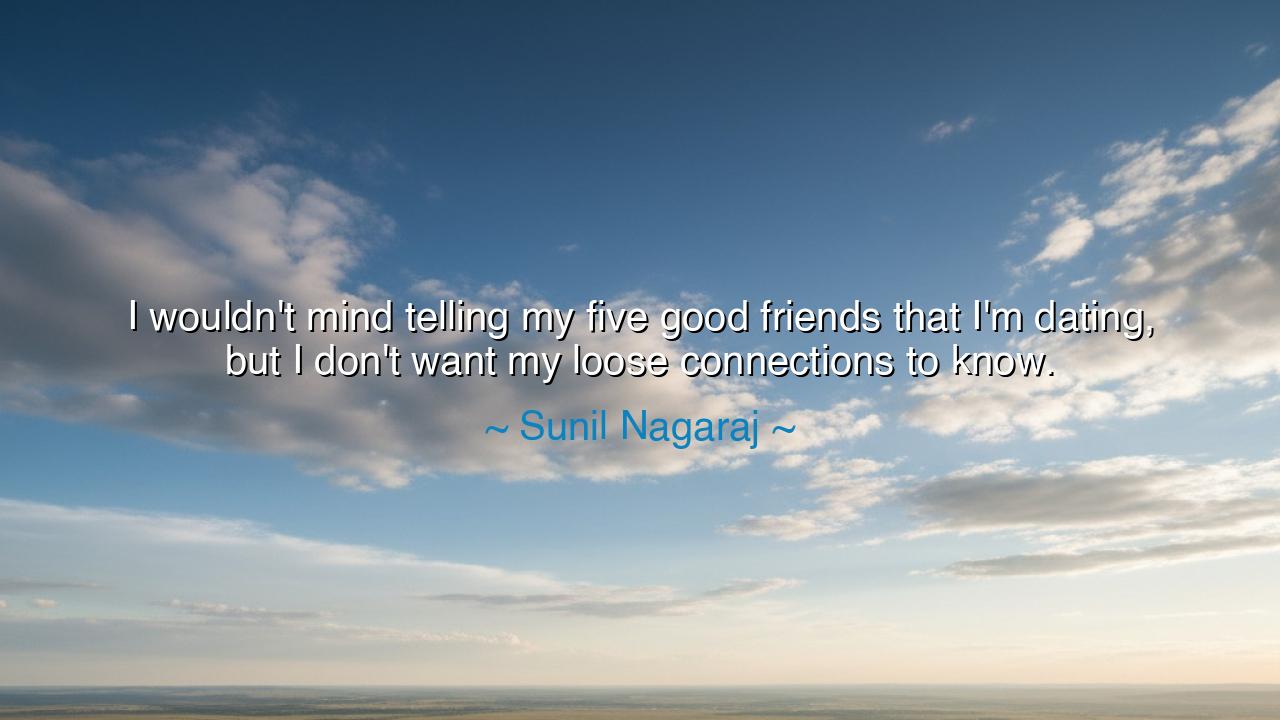
I wouldn't mind telling my five good friends that I'm dating, but
I wouldn't mind telling my five good friends that I'm dating, but I don't want my loose connections to know.






When Sunil Nagaraj said, “I wouldn’t mind telling my five good friends that I’m dating, but I don’t want my loose connections to know,” he spoke not merely of privacy, but of authenticity — of the sacred boundary between what is personal and what is merely public. His words reveal a yearning that echoes across generations: the desire to live truthfully, yet without spectacle; to share joy where it will be understood, and to guard it where it might be misunderstood. Beneath this simple statement lies a deep wisdom — that intimacy, whether in friendship or in love, must be protected from the noise of the world.
The origin of his thought springs from the age of digital transparency, when the walls between the private and the public have thinned to near invisibility. In a world of endless sharing, where every meal, journey, and feeling can be displayed to countless eyes, Nagaraj’s restraint feels almost ancient — a call to moderation, a return to the virtue of discretion. His distinction between “five good friends” and “loose connections” is not about arrogance or exclusion, but about understanding the sacred circles of trust. For not every truth is meant for every ear; not every moment of the heart should be cast before the crowd.
To the ancients, this principle was known as the law of the inner circle. The philosopher Aristotle spoke of friendship as existing in degrees — that true friends are few, for the soul can only share itself deeply with those who truly understand. The rest, the outer circle, may offer goodwill or acquaintance, but they cannot hold the weight of one’s heart. In this, Nagaraj speaks as one who knows the difference between connection and communion — between those who observe one’s life and those who truly participate in it. His reluctance to share his private joy with “loose connections” is a form of wisdom — the awareness that what is precious must be shielded, lest it be cheapened by careless eyes.
Consider the story of Marcus Aurelius, the philosopher-emperor of Rome. Though he ruled over millions, he kept his truest reflections locked within his private journal, the Meditations, never meant for public view. He wrote to strengthen his spirit, not his reputation. Only after his death did the world glimpse his inner life — and in that silence lay his greatness. Like Marcus, Nagaraj reminds us that there is strength in quietness, dignity in withholding, and sanctity in privacy. For what is unseen by the world is not less real — it is often more pure.
His words also speak to the fragile nature of modern relationships. In an era where affection can become a form of performance, where love is announced before it is even understood, Nagaraj’s caution carries the voice of humility. To share the tender beginnings of love with only one’s trusted circle is to allow it space to grow without judgment or interference. The wise know that the deepest roots form underground, unseen by the eyes of the crowd. Public scrutiny can wither what is not yet strong; only in the shelter of trust does affection mature into devotion.
There is also in his reflection a call to discernment — to know who in one’s life truly listens, and who merely watches. The “five good friends” he speaks of represent those rare souls who celebrate our joys without envy and stand by us without pretense. The ancients called such bonds philia — the friendship of virtue, where love is grounded not in benefit but in shared truth. The “loose connections,” by contrast, symbolize the fleeting, the curious, the ones drawn by novelty but not by loyalty. To keep one’s heart safe from their gaze is not secrecy, but wisdom — the art of knowing where trust should rest.
The lesson, then, is this: guard what is sacred until it is strong enough to stand. Whether it is love, ambition, or faith, not all beginnings are meant for the public square. Share your truth with those who have earned the right to hear it — the ones who listen without judgment and hold your story as carefully as their own. Do not mistake attention for understanding, nor visibility for value. The ancients taught that the seed must first grow in darkness before it blossoms in light; so too must our private joys be nurtured in the quiet soil of trust.
Thus, Sunil Nagaraj’s words remind us to live deliberately, to share selectively, and to cherish intimacy as the rare and sacred thing it is. In a world that confuses noise with connection, he teaches that the truest bonds are silent, the deepest friendships few, and the greatest strength found not in what we display, but in what we protect. For in the end, the heart’s truest treasures are not meant to be broadcast — they are meant to be lived, quietly, faithfully, and well.






AAdministratorAdministrator
Welcome, honored guests. Please leave a comment, we will respond soon